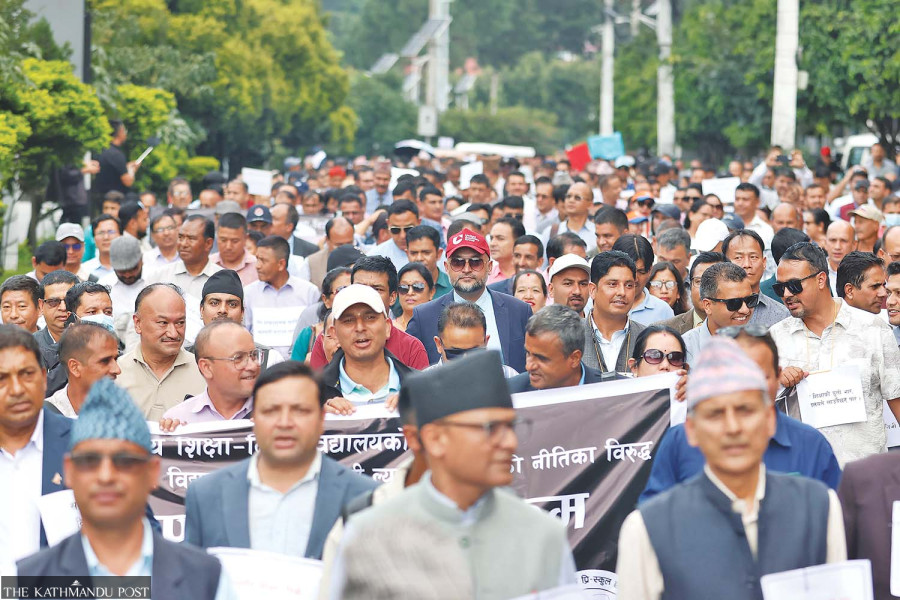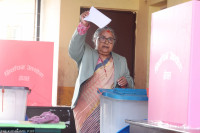Politics
House committee passes education bill despite opposition
RSP and RPP register notes of dissent to several provisions as private school operators launch protest.
Binod Ghimire
Nearly two years after its registration, Parliament’s Education, Health and Information Technology Committee has endorsed the School Education Bill amid reservations from the opposition.
The bill was endorsed through a majority vote after the CPN (Maoist Centre), the Rastriya Swatantra Party and the Rastriya Prajatantra Party registered notes of dissent on several provisions.
Despite the ruling parties’ commitment to table the bill in Parliament by June 29, the process took two more months, following sharp divisions among the parties on the provisions related to Early Childhood (classes before Grade 1) facilitators.
The ruling and opposition parties remained at odds over whether all the students receiving scholarships from private schools should also be getting hostel facilities for free.
As per the Free and Compulsory Education Act, schools with up to 500 students are required to provide full scholarships to 10 percent of their students. For schools with up to 800 students, the requirement increases to 12 percent, and for schools with more than 800 students, it goes up to 15 percent.
These scholarships must be divided equally between students who are academically sound and those from disadvantaged backgrounds. While the opposition said all of them, if necessary, should get free hostel facilities, the ruling parties said only 2.5 percent should get it.
Finally, the bill has been endorsed with a provision that private residential schools must offer free hostel facilities to three percent of the disadvantaged students who receive scholarships. The Maoist Centre and the RSP have registered a note of dissent to the provision.
“The bill will be registered in the House of Representatives within a few days for endorsement,” said Ammar Bahadur Thapa, chairperson of the House committee.
Private school operators have already started protests objecting to the provisions of full scholarship. They called for the removal of the provisions and have also opposed another provision which says private schools will be gradually converted into nonprofits.
“The bill doesn’t stop the establishment and operation of private schools. There is no need to blow the scope of the bill out of proportion,” said Devendra Poudel, a Maoist member of the committee.
The bill redefines Early Childhood Development to Grade 8 as basic level, and Grades 9 to 12 as the secondary level. Schools will have the option to teach in Nepali, the students’ mother tongue, or English.
Private schools will still be allowed to register and operate under the Company Act. For secondary education, schools can now offer different curriculum tracks, including general education, technical and vocational education, and traditional education.
Schools with foreign affiliation that are already operational will be allowed to continue, but no new registrations will be allowed. Local governments will also be given more power, including the ability to merge, relocate, downgrade, close, or rename schools based on local needs.
On teacher recruitment, 60 percent of teaching positions will be filled through internal competition, while the remaining 40 percent will come from open competition. This applies to relief, temporary, technical, and special category teachers, as well as teachers for Grades 11 and 12.
Likewise, community schools will be allowed to collect small, nominal fees from parents for supplementary income. While a teaching licence will now be mandatory for all teachers, having a degree in education will no longer be a requirement.
The main opposition says the bill has some regressive provisions that need to be revised. It says that currently working ECD facilitators must be allowed to participate in a teacher recruitment competition once, without any age limit. Those who do not pass the competition should be given a financial exit package based on their years of service. It has also demanded recognition for them as teachers, and deserving pay. The RSP also has similar demands.
The Maoist Centre also demands that students from martyr, missing, injured, and economically disadvantaged families should be provided with accommodation and uniforms. The government of Nepal should take full responsibility for implementing such provisions, it says.
“To improve the quality of public education, there should be a law requiring all the children of those who receive salaries from the state treasury [either father or mother, or both] to study in public schools,” reads one of its reservations.




 27.41°C Kathmandu
27.41°C Kathmandu













